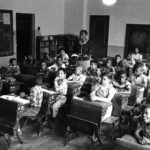SONOMA, Calif. (AP) _ Carolyn Kizer, a feminist Pulitzer Prize-winning poet who spoke her political mind even at age 7, has died in Sonoma from the effects of dementia, her literary executor said. She was 89.
Kizer, who won her Pulitzer in 1985 for a collection of work called “Yin” after the female principle in Chinese cosmology, died Thursday at a nursing home, executor David Rigsbee told the Los Angeles Times (Carolyn Kizer dies).
Born in Spokane, Washington, Kizer was 7 and attending a dinner party held by her parents when asked about political parties. She told guests “Oh, we veer with the wind.”
In an essay later, she said her father was angry: “I have suppressed what he said, but I know that I withered like a violet in an ice storm.”
One of Kizer’s best known works was “Pro Femina,” an ardent call for feminist progress. In one of the four poems making up the collection she wrote: “I will speak about women of letters, for I’m in the racket.”
When she wrote “Pro Femina,” she wrote about the 1920s, when female poets were mocked as the “Oh-God-the-Pain Girls.” She believed men encouraged that depiction. “Poetry wasn’t a craft but a sickly effluvium,” she wrote, “the air thick with incense, musk and emotional blackmail.”
Kizer had a poem published in The New Yorker when she was 17, but never placed another and it wasn’t until she was 29, divorced and a mother of three that she started studying poetry seriously.
“It was like a cork coming out of a champagne bottle, it was such a joy,” she told the Los Angeles Times in 2001.
She was a translator, adept in Chinese, Urdu and other languages. And she liked rewriting as much as she liked writing, often taking years to polish a single poem.
Her wit came through in nearly all her work. For example:
“Did you ever see someone coldcock a blind nun?
“Well, I did. Two helpful idiots
“Steered her across the tarmac to her plane
“And led her smack into the wing.
“She deplaned with two black eyes and a crooked wimple,
“Bruised proof that the distinction is not simple
“Between ineptitude and evil.”
She married Seattle attorney Stimson Bullitt in 1946 and they had three children before divorcing in 1954. She would marry architect John Woodbridge in 1975. He died in June.
In 1955 and 1956, she studied poetry at the University of Washington, and taught at the University of North Carolina and other schools.
In the late `60s, she was director of literary programs for the National Endowment for the Arts. She was a chancellor of the American Academy of Poets until 1998, when she resigned to protest the board’s lack of diversity at the time.









